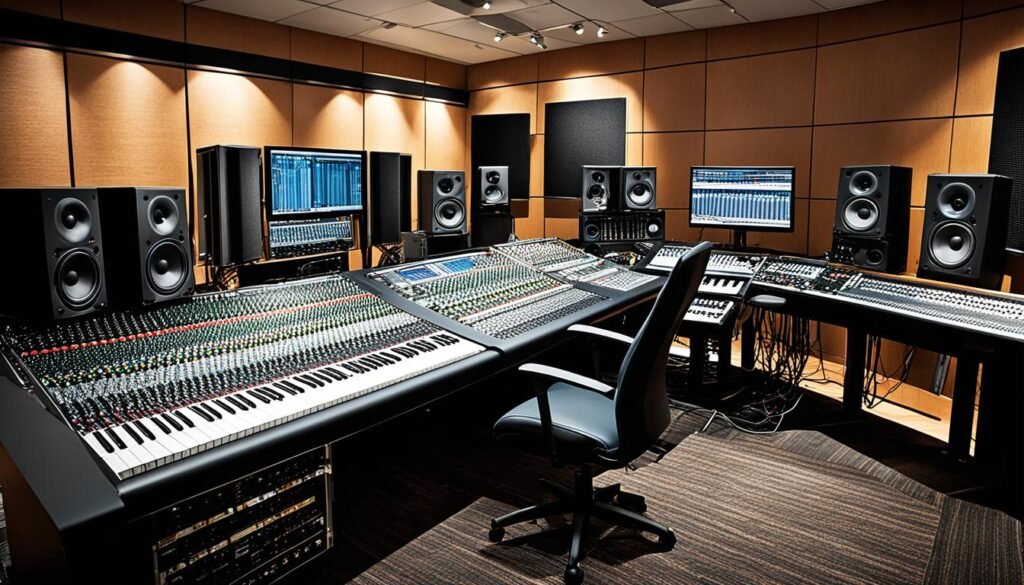The Music University Career Paths world has more than just performing careers. Musicians can use their skills and creativity in many areas, not just on stage. This article will look at different music university paths. It shows how musicians can find rewarding careers.
Also Read: Music Career Planning Guide: Start Your Journey
Key Takeaways
- Music university programs offer a wealth of career options beyond live performance
- Careers in music production, songwriting, and composing provide alternative pathways
- Music education and music therapy are two in-demand fields for music university graduates
- Technical roles in audio engineering and music licensing/copyright management are vital behind-the-scenes jobs
- Careers in music journalism, artist management, and sound design offer diverse opportunities
Beyond the Stage: Alternative Careers for Musicians
Many musicians dream of the spotlight, but there are many other paths in the music industry. Music production and songwriting and composing are two great options.
Also Read: How To Choose A Music University?
Music Production
Music producers work behind the scenes, making music sound great. They help artists improve their sound, mix tracks, and sometimes write songs. Good producers have a great ear, technical skills, and can make musicians shine.
Songwriting and Composing
Some musicians are great at songwriting or music composition. These skills are in demand for songs, TV, films, and ads. Songwriters create hits for various artists. Composers work on movie and game scores, needing to know different music styles and how to work with others.
These careers let musicians use their talents in new ways. They offer a chance for a fulfilling career in music production, songwriting, and music composition.
Also Read: Exploring Music Career Options: Your Guide
Music University Career Paths
There are many paths in the music industry, from performing to recording. Music education and music therapy are two fields that offer great opportunities for graduates. These fields let you share your love for music in meaningful ways.
Music Education
Teaching music is a rewarding way to share your passion and skills. Music teachers work in schools, colleges, and privately. They teach students about instruments, vocals, music theory, history, and technology.
This job needs deep music knowledge and patience. You also need to be able to communicate well to inspire and motivate students.
Music instructors and music professors are key in shaping the next generation of musicians. They teach the basics of music and help students develop a lifelong love for music. With musical talent and teaching skills, a career in music education can be fulfilling and impactful.
Also Read: Boost Your Music Career Growth : Tips For Success
Music Therapy
Music therapy uses music to help people with physical, emotional, cognitive, and social needs. It requires special training and certification. But, it’s a rewarding career that lets you change lives. Music therapists need empathy, a wish to help others, and good musical skills to use music therapeutically.
If you love teaching music or the healing power of sound, a music university education can lead to many rewarding careers. By improving your skills and knowledge, you can find your place and make a lasting impact in the music world.
| Music Education | Music Therapy |
|---|---|
| Teach music theory, instruments, and history in schools, colleges, and private settings | Use music to address physical, emotional, cognitive, and social needs of individuals |
| Require in-depth knowledge of music and excellent communication skills | Require specialized training, certification, empathy, and strong musicianship |
| Nurture the next generation of musicians and music enthusiasts | Make a real difference in people’s lives through the power of music |
Behind the Scenes: Technical Roles in Music

The music world has many careers that aren’t in the spotlight. Audio engineering and music licensing and copyright management are two key roles. They are crucial to the music industry.
Also Read: Best Career Advancement For Musicians
Audio Engineering
Audio engineers work hard to make sure music sounds great live or in the studio. They set up and use technical gear, control sound levels, and make sure the music sounds good. They work in places like concert halls, studios, and on broadcasts.
They need to know a lot about audio technology and have a great ear for sound. Audio engineers are key to making music sound amazing. They work in live shows and studios, making sure the music is perfect for listeners.
Music Licensing and Copyright Management
Music professionals can also work in music licensing and copyright management. These jobs deal with getting the rights to use music in things like movies, TV, ads, and online. It’s a complex process that needs a lot of knowledge.
Experts in music licensing know a lot about copyright laws and deals. They make sure artists get paid fairly for their music. They handle licensing, manage royalties, and look after music publishing rights. These jobs protect musicians and help music get used in different industries.
If you like the technical side of music or the legal side, these jobs are great. They offer exciting career paths for those who love music and pay attention to details.
“Music is the universal language of mankind.” – Henry Wadsworth Longfellow
| Career Path | Key Skills | Average Salary (U.S.) |
|---|---|---|
| Audio Engineer |
|
$55,000 – $80,000 |
| Music Licensing Specialist |
|
$50,000 – $80,000 |
The Written Word: Careers in Music Journalism and Critique

For musicians who love writing, music journalism is a great career path. It includes writing album and concert reviews, interviewing artists, and covering the latest music news. To be a music journalist, you need strong writing and research skills. You should also know a lot about different music styles and be able to give fair music critiques.
To be a music critic, you must give thoughtful reviews of music. Critics look at albums, live shows, and how music affects culture. They help readers make better music choices by sharing their insights.
Those who enjoy writing can also consider being a music writer or music editor. These jobs involve writing articles, news, and educational pieces about music. They work for music magazines, websites, or industry journals, helping to shape music discussions and keep the public informed.
| Career | Key Skills | Job Outlook |
|---|---|---|
| Music Critic |
|
Competitive, but opportunities exist in print, online, and broadcast media. |
| Music Reviewer |
|
Growing demand for online and freelance music reviewers. |
| Music Writer/Editor |
|
Opportunities in music publications, online media, and artist/label communications. |
Choosing a career in music journalism means combining music knowledge, writing skills, and critical thinking. Whether you want to be a critic, reviewer, writer, or editor, using the written word can let you share your love for music with everyone.
Guiding the Melody: Artist Management and A&R

In the music world, artist managers and A&R reps are key to a musician’s success. They know the industry well and can spot talent. They help artists improve their music, image, and growth.
Artist Management: Steering the Career Path
Artist managers protect an artist’s vision and act as strategic guides. They find new talent, deal with contracts, and promote their clients’ music. Good managers have strong networks, industry smarts, and can predict market trends.
A&R: Discovering and Developing Talent
A&R reps are the music industry’s talent scouts. They look for new artists, check their potential, and guide their creative path. They work with artists, producers, and writers to make music that hits the mark.
Both artist management and A&R careers need a deep music industry knowledge. These jobs require great communication, negotiation, and planning skills. They’re key to thriving in the fast-changing music world.
Sound Design for Film and Video Games
Careers in sound design careers, audio for film, and audio for video games are exciting for music lovers. Sound designers create sounds that make movies and games more immersive. Their skill in making unique soundscapes is crucial in these fields.
“The music you choose can make or break a scene. Sound design is the unsung hero of the audiovisual experience.”
Whether it’s guiding artists or creating movie and game sounds, these jobs let people turn their music passion into rewarding careers.
Also Read: Exploring The Premier Music Colleges For Career Advancement
Conclusion
The world of music has many career paths beyond the stage. For those ready to explore, there are many ways to use musical skills and passion. These jobs offer stability, fulfillment, and a way to stay close to music.
Jobs like music production, songwriting, and audio engineering are just the start. Roles in sound design for movies and video games let musicians use their skills in new ways. Careers in music therapy and artist management also let people use their musical talents to help others.
The career of a musician can have many beautiful paths. Whether you’re on stage or behind the scenes, music offers a rich world of possibilities. By exploring the many careers in music, you can find your own path to success and happiness.
FAQs
Q: What types of music degrees can I pursue at music schools?
A: At music schools, you can pursue various music degrees, including a Bachelor of Music, Master of Music, and even doctoral programs in areas such as music performance, music education, and music technology.
Q: What is the difference between a music major and a music minor?
A: A music major is a primary field of study where students take a comprehensive set of courses focused on music, while a music minor involves fewer courses and is typically pursued alongside a different major, providing a foundational understanding of music.
Q: How can I pursue a career in music with a music degree?
A: To pursue a career in music with a music degree, you can specialize in areas such as music business, performance, or education, and use internships and networking opportunities provided by your music school to establish connections in the music industry.
Q: What career paths are available for music students after graduation?
A: Music students can explore a variety of career paths including becoming music educators, performers, composers, audio engineers, or working in music business and management.
Q: Is it necessary to have a graduate degree to succeed in a music career?
A: While a graduate degree can enhance your knowledge and credentials, it is not strictly necessary to succeed in a music career. Many successful professionals have built their careers with a bachelor’s degree and relevant experience.
Q: Can I study music technology as part of my music degree?
A: Yes, many music programs now include courses in music technology, allowing students to learn about recording, sound design, and other technological aspects of the music industry.
Q: What are some popular music career options for music majors?
A: Some popular music career options for music majors include roles in music performance, music education, music therapy, and positions within the music business such as artist management and record label operations.
Q: How important is it to participate in ensembles while studying at a music school?
A: Participating in ensembles is crucial for music students as it provides practical experience in collaboration, performance, and helps build a network of contacts within the field of music.
Q: What role do internships play in pursuing a music career?
A: Internships provide invaluable hands-on experience and networking opportunities that can significantly enhance your resume and help you secure a job in the competitive field of music after graduation.




